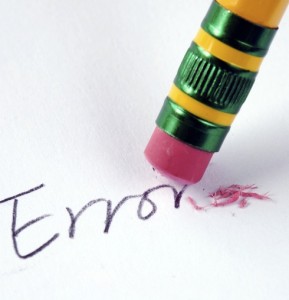The perils of polishing transcripts
Public trust is a terrible thing to lose, and the intelligence community will have to win trust back one small step at a time. Here's a good place to start. When a top intelligence official talks to reporters, the community should end the practice of cleaning up the official transcript. The actual words spoken today form an important record for journalists and historians who will one day try to understand these times.
As surprising as it is in the wake of the Snowden affair, the Office of the Director of National Intelligence seems perfectly content to have on its website a transcript that it knows is less than accurate.
How did this happen? On May 22, Dawn Meyerriecks, the community’s acquisition chief, met with reporters shortly before moving over to the number two science and technology position at CIA. When Meyerriecks listed the community’s top three priorities, she placed “CT, counterterrorism, of course” in the second slot and omitted cyber programs.
CT is usually a bureaucratic euphemism for the drone war. It’s something you don’t hear a lot in briefings. Cyber, on the other hand, is a favorite topic.
I wasn’t the only one whose ears perked up. Minutes after the briefing, a spokesman for Meyerriecks sent reporters an email saying the top three priorities of the community are: “1) People 2) cyber 3) Preserving R&D.”
I wondered to myself whether the CT reference was an unwitting glimpse of the truth. It’s always seemed odd that counterterrorism wouldn’t rank among the top priorities, given the drone war and what we now know is an aggressive and expensive series of surveillance programs. I filed away the anecdote as something to explore later. It certainly didn’t warrant a story at that point.
When the Office of the Director of National Intelligence posted the transcript on its website, it replaced the CT reference with the phrase “cyber, of course.”
The polished transcript is still out there, just one click away from the transcript of Director James Clapper’s interview with MSNBC's Andrea Mitchell.
I asked about the change. A spokesman said Meyerriecks simply misspoke when paraphrasing the standard leadership line about priorities. I can accept that explanation. What I can’t accept is changing a transcript. By definition, a transcript means a person’s spoken words. It’s not what the public affairs shop or anyone else wishes had been said.
If Clapper’s office was worried about erroneously signaling a shift in priorities, fixing the transcript wasn’t the only way to handle that. It could have decided not to post the transcript or it could have included an editor’s note showing the error and correction. Changing history, even in small ways, is a slippery slope that the government should never set foot on, especially when it’s trying to win back trust.
Mike Birmingham, the spokesman who organized the briefing, stood by the change. He told me by email that Meyerriecks knew about the alteration and that I missed my chance to object:
“The ODNI Public Affairs Office changed one word in the Dawn Meyerriecks roundtable transcript to accurately reflect the ODNI leadership’s top three priorities after consulting with Ms. Meyerriecks and the reporters present, and no one objected, including Ben Ionnatta (sic.).”
I didn’t notice the reference to changing the transcript until I reread the post-briefing email. I certainly hope I would have objected, but I can’t see why it should have been up to me or anyone else to do so.
This issue has bothered me for weeks, so I emailed Bernadette Meehan, a spokeswoman for the White House national security staff. I asked Meehan about the administration’s policy on changing transcripts. She referred me back to Clapper’s office.
The Obama administration wants to be trusted. A good place to start would be to remember the government's responsibility to leave an accurate historical record.



